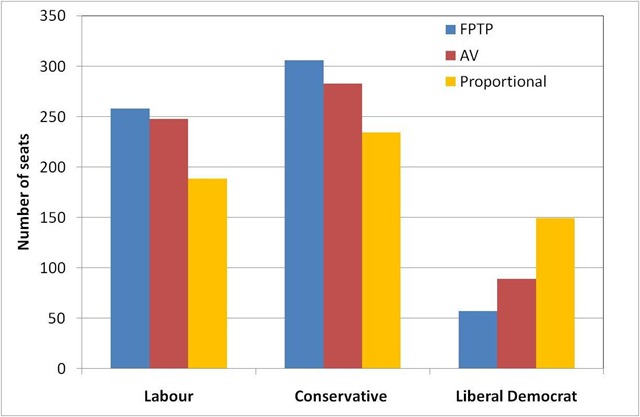In this post I will argue that all of the political parties are arguing the case for AV in their own self-interest, this is very obviously what they are doing and admitting such will make a change.
I’d like to start with the electoral system as it stands today:
Two things are going on at an a general election: there are “local” elections in 650 constituencies which determine which individual represents each constituency in parliament and then there is the government formed as the result of this set of elections. Once elected to parliament MP’s represent their constituents interests but vote largely as whipped by their political party.
First past the post (FPTP) and Alternative Vote (AV) are both algorithms for determining local representation: they make no deliberate effort to make the output of a collection of constituencies proportional to the proportion of votes cast for a particular party across the country. The degree to which they give proportionality is dependent on the spatial distribution of voters for each party across the country and the locations in which electoral boundaries are drawn1. The current distribution of party support is not far off the point where it can give completely perverse results with the Liberal Democrats gaining the largest fraction of the popular vote and the fewest parliamentary seats and Labour gaining the smallest fraction of the popular vote and the largest number of parliamentary seats2.
The FPTP system acts to supress the formation of more than two political parties, this is known as Duverger’s law. You can see this in action in the UK, with the separation of the SDP from Labour in the early 1980’s, gaining a large fraction of the popular vote: approaching that of Labour, but nothing like the same number of seats3.
Best estimates for AV in a UK general election are that the Liberal Democrats will gain seats in a Westminster election and Labour and the Tories will lose some, it isn’t particularly clear who will lose most.
So moving on to the self-interest of parties:
The Liberal Democrats are in favour of AV because they will get more seats, this is OK because they will still have far fewer seats than their proportion of the vote should allow.
The Tories are against AV because they believe that they will lose seats to the Liberal Democrats for the same share of the vote, and that Labour-Liberal Democrat coalitions are more likely than Tory-Liberal Democrat coalitions. Wait! What?
Labour is split on AV, this is because some believe that Labour-Liberal Democrat coalitions are more likely than Tory-Liberal Democrat coalitions, and the Tories could be basically locked out of power for ever. Others in Labour, on the left of the party, believe that the Socialist utopia should be pure and that coalition is anathema and so oppose AV.
UKIP is in favour of AV because they believe that they will be first preference for a number of people who vote Tory tactically and second preference for a number of Tories. Their visibility will rise, even if it doesn’t lead to much increase in seats.
The Greens are in favour of AV because they believe they will pick up second preferences from Liberal Democrats and Labour.Their visibility will rise, even if it doesn’t lead to increased seats.
The BNP is against AV because it judges that it will not pick up second preferences from anyone. It decreases the likelihood of them gaining seats even if it increases the visibility of the party. The BNP is entirely visible already but for the wrong reasons.
Oddly those on either side of the debate are able to draw on arguments that match the self-interest of their parties. What is the non-aligned voter to make of this?
Footnotes
- Oxford is a nice example of this: across the two Oxford parliamentary seats (Oxford East and Oxford West and Abdingon) the number of votes for the three main parties are (LibDem: 41087, Tory: 33633, Lab: 27937. The two constituencies return a Labour and a Tory MP.
- Don’t believe me? Put Tory: 33.2%, Labour: 27.2%, LibDem: 27.7% Other: 11.9% into this BBC seat calculator. The actual result was Tory: 36.1%, Labour: 29.0%, LibDem: 23.0% Other: 11.9%
- The 1983 General Election. Vote share: Tory: 42.4% Labour: 27.6% SDP+Liberal Alliance: 25.4% Number of seats: Tory: 397 Labour: 209 SDP+Liberal Alliance: 23.
- Given 1-3, on what basis is it that we claim to live in a democracy?

